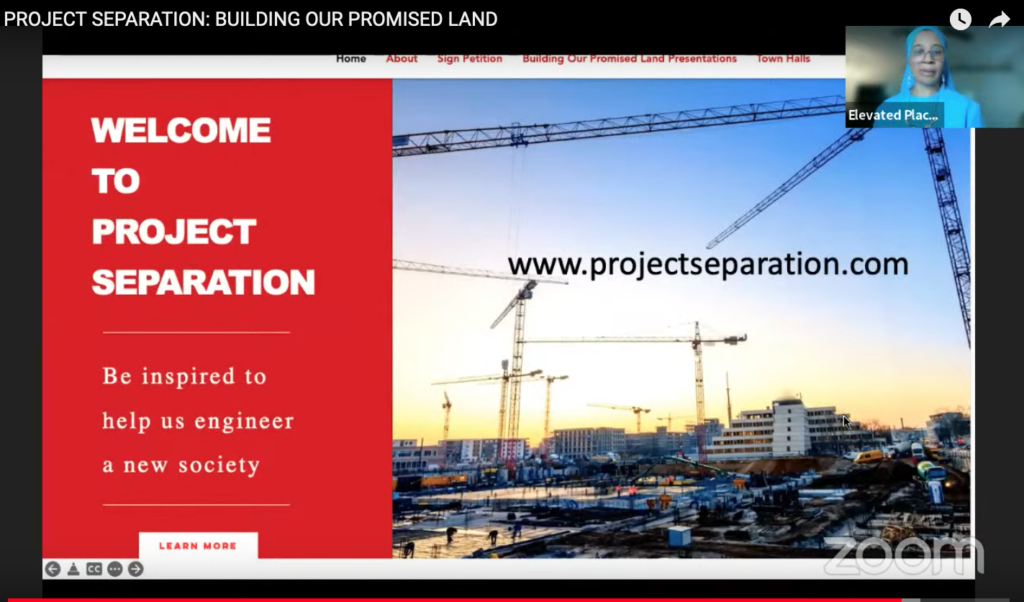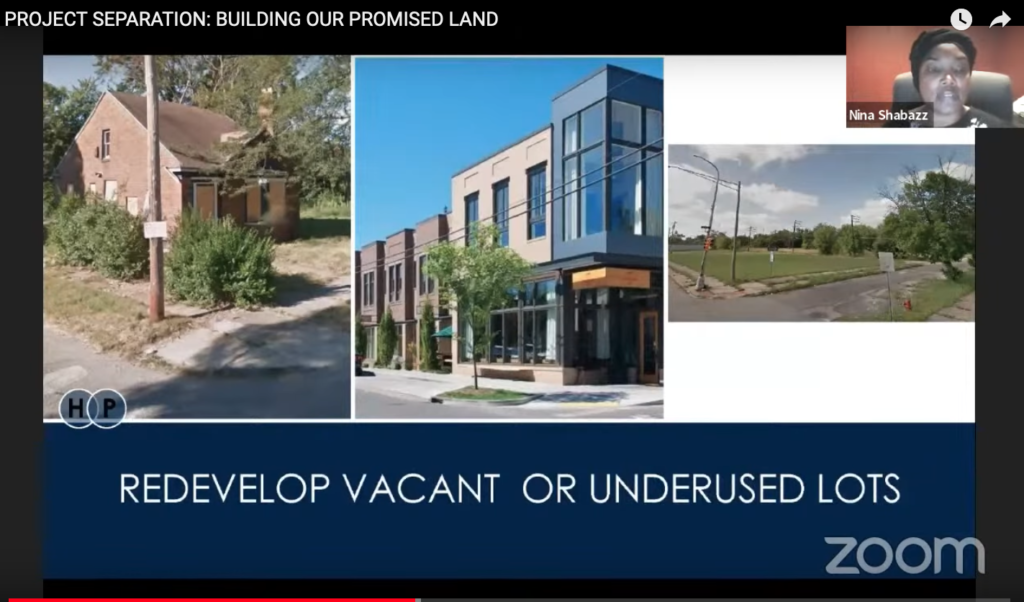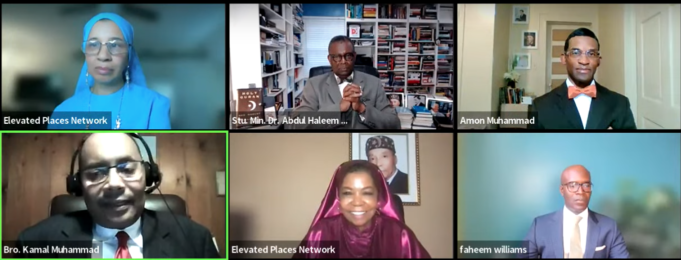A Zoom workshop titled “Building our Promised Land: Rebuilding the Wasted Cities Making Detroit Our Mecca – Part 2, A Call to Action” was recently hosted by the Elevated Places Network. It was the seventh in a series of workshops designed to inspire the Black community to not only separate from White society but to engineer a new society.
Conference convener Student Minister Ava Muhammad acknowledged Detroit’s role as the New Mecca in her remarks. “It was Allah who gave Brother Kamal Muhammad this idea, which he brought to the Honorable Minister Louis Farrakhan. This is the new Mecca. Allah allowed that city to collapse so that it can be returned to us,” she said.
Seven years ago, Kamal Muhammad established the Detroit Mecca Project, a progressive homeownership program.
“From the Honorable Minister Louis Farrakhan, we’ve learned three sciences we were deprived of in slavery that are vital for nation-building: the science of mating, the science of business, and the science of war, and we’re in a war right now. We must move toward making our own communities safe and decent places to live as the first step toward separation, but it is essential for survival,” Ava Muhammad said.

It was clear from the expert panelists’ presentations that the Black community has the skillsets to build model communities as a step toward establishing safe and cohesive communities. But it will take vision, will, organization, and financing.
Kamal Muhammad showed a slide show of homes already purchased through his Detroit Mecca Project. The project aims to create homeownership by purchasing affordable housing in the Detroit neighborhoods of Grand River-Greenfield and Highland Park.
He explained that a long-term goal of Highland Park is to create a Muslim community that includes an innovation corridor. Moderator Donna Muhammad pointed out during the April 19 discussion, “We are dealing with a directed and focused movement. Once we overpopulate an area, we begin to gain control. Our time has come, and this is what we must do for ourselves,” she said.
“Now is the time to take advantage of this,” Kamal Muhammad concluded. “I know many of you are interested in property. I urge you to take full advantage of this opportunity that Allah has given us to build our community which we control.”
Master urban planner Nina Shabazz from the East Coast presented a slide show on what a developed Highland Park neighborhood might look like. She outlined everything from the basics to the details while discussing zoning codes and design. She envisioned city signage, cottage courts, innovative corridors, senior housing, housing renovations, urban gardening, business incubator zones, and health and safety improvements.
“The past must be honored while the future reimagined. Why can’t we make our neighborhoods look like the ones Becky and Bob have through gentrification?” she asked.
Student Minister Dr. Haleem Muhammad, a Houston-based urban planner, pointed out that applying the blueprint provided by the Honorable Elijah Muhammad could be achieved seamlessly.
“When we were in Africa at the Black Star Square in Accra, Ghana, the Honorable Minister Louis Farrakhan said vision is the key to leadership. You don’t need all the expertise yourself if you have a vision and call on the talent of others. From the vision, you can call the people needed to implement the vision. The vision and blueprint exist already,” he said.
Dr. Haleem Muhammad referred the audience to the magazine “Accomplishments of the Muslims,” published by the Honorable Elijah Muhammad in the 1970s, which included a flow chart and blueprint detailing everything a sustainable community needs, including food, clothing, shelter, technology, and health care.
He suggested using nine ministries envisioned by Minister Farrakhan, including agriculture, education, information, health, trade, commerce, defense, justice, arts and culture, and science and technology.
“Spiritual development, ethics, and morals guide all,” said Dr. Haleem Muhammad.

“With the talent and skills we have among us from the rural areas, all the way up to the urban core, we have the skills to do it. Sisters and brothers, our only question is, do we have the will to do it?” he asked. “We can build safe and decent places where we can live, worship, work, learn, and play, as the Honorable Minister Louis Farrakhan taught us. We can do that in Detroit or wherever we want.”
With the program swiftly moving from visualization to organization, the final part was implementation presented by Houston design-builder Faheem Muhammad. “Sister Nina has done the work and presented a solid vision for all we should be doing and implementing in a long-term vision; what a high-level approach she brought,” Faheem Muhammad said.
“As for implementation, we need to develop a schedule. When we say we’re going to roll out and do things, we need to plan some of the key pivotal things we need to put into practice first,” he continued. He talked about having specific standards in such areas as regulatory requirements, zoning regulations, and controlling what is seen and moves in communities.
As Kamal Muhammad emphasized and the panelists agreed, finance is the greatest need to move the project forward.
“We need money. We are trying to buy land or property or both to develop,” he said. “Many people have contacted me with financing deals worth millions, which we need. We have also formed a nonprofit corporation, The Detroit Mecca Project Incorporated, which will enable us to accept donations. Additionally, we are working with banks that we believe will help our buyers and us. We have a lot of opportunities that are opening up for us lately,” he concluded.













